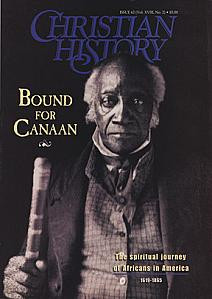Born an Obscure Slave, Frederick Douglass Was World-Famous at His Death

Frederick Douglass’ life changed for the better after he learned he could have God for his father.
FREDERICK DOUGLASS* was born a slave around 1818 but died internationally known and honored in 1895.
His path to success was not easy. Taken from his mother as a child, he was sent to live with his maternal grandmother, who died when he was seven. After that he had no one to shield him from the full injustice of the slave system. Although one master’s wife helped him learn the alphabet, most slave owners treated him brutally. He longed for someone to protect him. When he was thirteen, he found that protector. A white Methodist preacher showed him that he could have a father in God. “Though for weeks I was a poor broken-hearted mourner traveling through doubts and fears, I finally found my burden lightened, and my heart relieved. I loved all mankind, slaveholders not excepted, though I abhorred slavery more than ever.” He studied the Bible and taught forty fellow-slaves to read. Douglass later said, “He who does not improve himself by the motives and opportunities afforded by this world gives the best evidence that he would not improve in any other world.”
Half-starved by Thomas Auld, one of his masters who claimed to be a Christian, Douglass often contrived to loose one of his master’s horses, knowing it would run to a neighboring farm. He would follow and recapture it, sure of getting a good meal from the cook. When Auld could not break Douglass of this practice, he sent him work for a tough planter known for “breaking” slaves.
Covey, the planter, beat Douglass often until one day the desperate boy, then about sixteen years old, fought back and got the best of the man. After that Covey did not try to whip him again. Three years later, Douglass fell in love with Anna Murray, a free black woman. She encouraged his plan to run north toward freedom. In 1838 he escaped to Pennsylvania dressed as a sailor and carrying false papers.
He hurried to New York where Anna joined him and they married. The newlyweds made their way to Massachusetts. There Douglass came into contact with abolitionist William Lloyd Garrison, who encouraged Douglass to write and speak for the Massachusetts Anti-Slavery Society. As one of its spokesmen, Douglass visited Britain and Ireland where he won many friends. Eventually he broke with Garrison, finding him too radical, and published his own anti-slavery journals.
Douglass was an important spokesman in the abolitionist cause and an ordained minister in the African Methodist Episcopal Zion Church. He did not remain many years with this church, however, because he felt it was tainted by the dominant American acceptance of slavery. He rejected any Christianity that endorsed or tolerated the enslavement of one people by another.
“I have, in several instances, spoken in such a tone and manner, respecting religion, as may possibly lead those unacquainted with my religious views to suppose me an opponent of all religion....What I have said respecting and against religion, I mean strictly to apply to the ‘slave holding religion’ of this land, and with no possible reference to Christianity proper; for, between the Christianity of this land, and the Christianity of Christ, I recognize the widest possible difference—so wide, that to receive the one as good, pure, and holy, is of necessity to reject the other as bad, corrupt, and wicked. To be the friend of the one, is of necessity to be the enemy of the other. I love the pure, peaceable, and impartial Christianity of Christ: I therefore hate the corrupt, slave holding, women-whipping, cradle-plundering, partial and hypocritical Christianity of this land.”
During the Civil War, Douglass met President Lincoln, with whom he discussed the recruitment and treatment of black soldiers. After the end of slavery, he held several government posts, including that of minister-resident and consul general to the Republic of Haiti.
On this day, 20 February 1895, Douglass collapsed suddenly and unexpectedly while speaking with his wife. Although a doctor reached his side quickly, he was unable to revive Douglass. Douglass was about seventy-eight years old, among the best-known and most loved African-Americans of his generation.
—Dan Graves
* He took the name Douglass after his escape.
----- ------ ------
For more about the Black experience in America, read Christian History #62, Bound for Canaan






